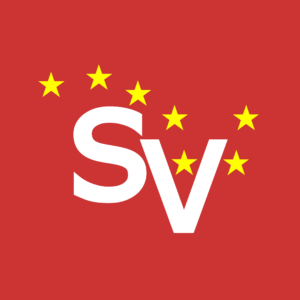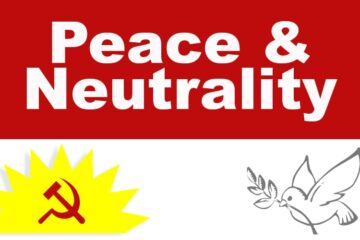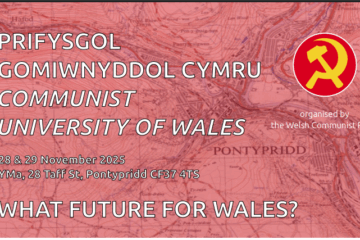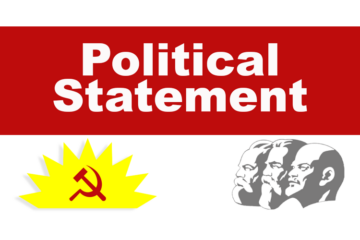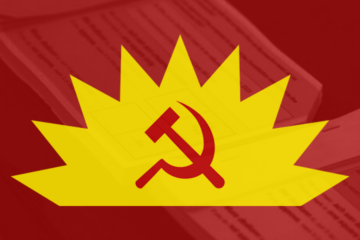“Back to the future: Class and its distinctions in twentieth-century intellectual thinking”
The future of socialism is not an abstract or academic question, as the title of this session might suggest. Whether considered as a coherent political ideology or as a social and economic system based on the social ownership of property, its future is entirely dependent on the actions of real people in the material world, on the ideological struggle for ideas and the class struggle for human emancipation.
While there are many “varieties” of Marxism, the core tenets of Marx’s thinking are readily stated. Above all else, Marxism is a theory of human action. Human action creates the relationships between people, creates human society, and brings about social change (also known as history). Marx regarded work, in the broadest sense, as the crucial human action: work is the creative human activity that lies at the heart of everything else in society: culture, politics, law, knowledge, education.
Marxism is also rooted in materialism. For Marx, everything exists in relationships; everything is connected to the material world in which it exists, and nothing floats free of this connectedness. The structures in society and economy are actually sets of human relationships. It is impossible to identify the structures of society or the economy outside of the human relations between people that define them.
Class is central to all Marx’s thinking. Class is derived from our relationship to the means of production: those who own property are the dominant and ruling class in society; those who don’t own property and are forced to sell their labour to those who do are the workers, the working class. This is crucial—in the first place, because the working class is forced to sell its labour in the marketplace; workers no longer control or “own” their labour, the central creative action in their lives, and are alienated from both their work and the product of that work. They are subject to the decisions, goals, and intentions of the owners of property, the ruling class. Instead of forming free and fully human relations with each other, we meet each other in the marketplace, and our relationships are distorted and transactional.
Secondly, because human beings come together in the first instance to produce the means of their existence, class is at the heart of everything in a society based on the private ownership of property. Who owns property determines what is produced and how, and what the relations of production are. Human societies grow and develop from this first coming together, creating politics, law, culture, knowledge, and everything else in society. And, from the beginning, each of these is imbued with the practice and ideology of the private ownership of property, of class, the ideas and interests of the dominant or ruling class.
The state, as we understand it, emerges because of the conflicting class interests in society; it ensures and promotes the interests and ideas of the property-owners, the ruling class. When considering the material advances of the working class at times in the countries where social democrats have been in government for some time, we should bear this in mind. Welcome and real as many of these gains are, do they undermine or challenge private property, or do they consolidate the class system?
Imperialism, sometimes referred to as monopoly capitalism, is the structural expression of class and private ownership of property in the contemporary world. It arises from the consolidation of productive and financial capital into bigger and fewer corporations, and the subsequent superseding of productive capital by financial capital, which becomes dominant in the imperialist system. The export of financial capital exceeds the export of goods, and the global division of labour becomes restructured.
Alongside these economic changes, a new political division of the world into spheres of influence and interest develops. This is decisively different from the old colonial order, and indeed colonies have largely disappeared from the imperialist world, replaced by new sets of economic and political relationships of domination and control.
As I pointed out at the beginning, the future of socialism is not an abstract question. Armed with an understanding of the basic ideas of Marxism, we can begin to look at the world as we find it today and at how we can change it. We see that there are clear, separate class interests and relationships at both the national and the international level.
The backdrop to our discussion today is complex but not impossible to unravel and to understand, allowing us to develop strategies for a way forward. Among the features of the world today are:
- The overthrow of socialism in eastern Europe, the victory of counter-revolutionary forces, and the continued unfolding of the impact of that victory at the end of the twentieth century
- NATO’s proxy war in Ukraine
- The growing drive for war, with the encirclement of China by the imperialist powers
- The EU imperialist superstructure, mired in intensifying contradictions, and its vassal relationship with US imperialism
- The intensified super-exploitation of labour globally
- The growth in power and control by global finance capital
- The growing and deepening environmental crisis
- The growing assault on democracy, and the accompanying campaign to defeat “populism”
- The rise of China as a global economic power and the emergence of BRICS and a multi-polar world
- Growing struggles for national sovereignty and independence and against neo-colonial domination in Africa, Asia and Latin America.
- Growing disillusionment among the working class in trying to see a way forward or a release from poverty, from precarious employment, precarious health services, precarious old age.
Much of the debate on the left, and particularly in academic circles, over the last few decades has been narrowly focused on the “defeat of socialism,” in particular the overthrow of workers’ power in the Soviet Union. Some on the left, left liberals and social democrats, welcomed this defeat, believing that it would lead to a flowering of “real socialism,” while others on the left—including the CPI—looked on in frustration at the victory of reaction and at the limited defence of socialism that was put up.
The victory of those counter-revolutionary forces led to the emergence of a unipolar world dominated by imperialism, particularly the United States. It also led to more intensified attacks on the social advances made by the working class globally, and particularly in developed capitalist countries, and the rout of social democracy, particularly here in Europe, as it adopted and championed the economic, political and social priorities of the capitalist class, in the form of neoliberalism, policies that were and are required by the system to save the system.
In many ways, focusing on the defeat of socialism in eastern Europe has allowed sections of the left, left liberals and social democracy to ignore their own deep failures. We have experienced and are experiencing a deepening of the super-exploitation of workers nationally and, most importantly, globally.
In the developed capitalist countries, we have witnessed limited resistance to wars, both large and small, around the globe, orchestrated by imperialism and in particular by the United States and NATO, to ensure the continued domination of global finance capital and the imposition of policies conducive to the interests of finance capital globally, and to reassert US and Western leadership and hegemony. The proxy war in Ukraine is a prelude to a possible war on China, a war that could well escalate into a nuclear conflagration. It is clear that monopoly capitalism is finding it increasingly difficult to compete with China. This is expressed in the imposition of sanctions and economic restrictions and the military encirclement of China.
Such policies are imposed by “soft power” (for example through culture and trade) and through supranational institutions (exercising both soft and hard power), such as the World Bank, the International Monetary Fund, the International Criminal Court, and the European Union, enabling super-exploitation and domination. Where these policies are challenged, force is applied to ensure compliance with imperialism’s “rules-based order”—the global architecture of imperialism. QUAD and AUKUS (hard power) have been created to encircle China and initiate another war, which will be a disaster for the working class all over the world. The growing military structures of the EU add to the increasing militarism and aggression.
Certainly, here in Ireland significant sections of the left, social democracy and left liberals have failed to address the role of imperialism in our own country over the course of the twentieth century and into the twenty-first century. The labour movement as a whole tried at all times to avoid doing anything regarding the conflict in the Six Counties. The labour movement and social democracy failed to understand, never mind challenge, Ireland’s relationship with imperialism—how that relationship has changed and is changing, how the strategy of imperialism is to make sure there’s no “future of socialism”—what Irish communists describe as the “triple lock” of imperialism.
I believe there are three essential questions that the left must address and come to grips with if the workers’ movement is to advance.
- That all politics is about class, and that different classes and class interests exist and compete. Recall here that the class issue concerns the private ownership of property, and that class struggle revolves around this.
- That the state is not neutral but is the means by which the dominant class controls and organises society, economically, culturally, socially, and with legal structures, to ensure the best conditions for protecting the capitalist mode of production and the reproduction of capital.
- That imperialism exists; that it is the highest and most developed stage of capitalism, where finance capital is the decisive feature, and which is also the stage of its decay.
Class
All things in a class society are influenced and shaped by the dominant class. Under capitalism, the state is the main vehicle for securing the needs of capital, for sustaining the exploitation of workers, and for creating the best conditions for securing the capitalist mode of production, a system of exploitation.
This is the only basis on which we can understand class: that the state and society are structured by capitalism, and that this is how it develops to meet its needs, that is, the reproduction of capital.
We need to look at the class structure of any given society in its material reality, in its development and the strategic needs of capital. This will shape capital’s strategic relations with other classes in order to ensure bourgeois hegemony, shaped by the capitalist mode of production, and its drive to intensify the rate of exploitation.
The ruling class in developed capitalist countries, under financialisation, as compared with earlier periods, has applied the scientific and technological revolution over the last five decades to enhance its capacity to shift industrial production to cheap-labour countries and to push migration towards developed capitalist countries to meet labour shortages—notwithstanding much official hostility to migrants; and now artificial intelligence will be added to its toolbox.
This involves the growth of the middle strata in society but also its changed character, its relative immiseration and growing contradictions with the interests of big monopoly capitalist interests, and the growing proletarianisation of what was once considered “intellectual labour.”
The nature of bourgeois ideology and how it shapes people’s world view tends to encourage the middle strata of society into alliance with the ruling class. This is even more so when we have a weak and under-developed working-class consciousness. A radicalised working class can attract sections of the middle strata into an alliance to advance shared goals for a more radical transformation of society.
The State
The state is not neutral. It is not “above classes,” nor a neutral arbitrator between contesting class interests: instead it is essential for securing the interests of capital. Its various institutions are designed and “hard-wired” to ensure the continuation of the capitalist mode of production. There is no equality of ideas, or free flow of ideas, such as an alternative world view, within the myriad of state and ideology-generating institutions.
The state is the crucial instrument for the expression of class power. While there is great flexibility regarding how ruling-class power can be made more acceptable and camouflaged, its essential role is coercion, in ideological, economic, cultural, social and political conformity; but it also conducts ideological struggle, through culture, education, law, and all facets of society, to encourage consensus, compliance, and submission. Within this conformity there is some flexibility: it is a room with many mirrors but no windows, no view of any possible alternative world view, no alternative to capitalism. The state’s role is to ensure the capitalist mode of production and to present it as simply the “common sense” way to organise human relations. Nonetheless, the state is also an arena of class struggle.
Imperialism
The CPI believes it is essential for any progress to be made that we have clarity and understanding regarding the nature and role of imperialism in Ireland—or, to put it another way, to understand that imperialism actually exists.
We hold firmly to Lenin’s understanding of imperialism, whereby he described it as the highest development of capitalism. That was at the end of the nineteenth century, when productive and financial capital had consolidated into bigger and fewer corporations, and finance capital had taken control over large-scale industry and had come to dominate state policy in the most powerful countries. That deepening control is reflected in the growth in financialisation.
The contradiction between manufacturing and finance capital has not disappeared, as is evident from the referendum in Britain in 2016, in which finance capital in general supported Remain and manufacturers on the whole supported Brexit. Despite the great strength of finance capital in London, Britain voted narrowly to leave; but in general, the interests of finance capital dominate and are primary.
Finance is the dominant and controlling power in economics and politics. The clearest example of this dominance is the continuing refusal of the rich imperialist states to take significant action to prevent further destruction of the environment. Profit for the financial elite is their overwhelming motive, and nothing is allowed to stand in its way. At the national level we are now experiencing the grip of finance capital on the provision of shelter.
Imperialism shapes the nature of the dependence it imposes, the state structures it requires, imposed on states it controls in its pursuit of cheap labour for super-exploitation, for its control of markets, resources, and spheres of influence.
The non-economic superstructure that grows up on the basis of the needs of finance capital, its politics and ideology, propels the drive for spheres of influence and drawing more countries and territories into the grip of the big powers. This is true of Ireland as much as elsewhere, with this state’s over-reliance on foreign direct investment and the creaming of surplus “imperial rent” from transnational capital. The Irish ruling class had, and has, little or no interest in asserting any degree of independence or in advancing national sovereignty. It is only too willing to be subservient to the needs of imperialism for its own existence, its own self-preservation.
As events now unfolding show, the growth and influence of China, as a competitor to western imperialist economic domination and hegemony and as a potential alternative source of capital investment and social development, is creating conditions whereby once again the question of national sovereignty, of economic, political and cultural domination, is becoming a critical one throughout the global south, reflected in the emergence of the bloc of countries gravitating around the BRICS and the changing relationship this diverse group of states has with the existing imperialist power blocs: the United States, the European Union, and Japan.
It is the conflicting interests that they have with the dominant imperialist blocs that is propelling this evolving process. No, they are not leading the charge for socialism, but this movement has the potential to weaken the global economic and military hegemony of the United States, the European Union, and Japan. It may well create space for the emergence of other ideas and different ways forward, socially and economically. Given the diverse nature of these forces and conflicting interests, and the difficulty of seeing what the outcome could be, we must not dismiss these developments out of hand.
China is leading in 37 out of 44 path-breaking technologies, such as electric vehicles, space exploration, green energy, superconductivity, artificial intelligence, and other fields. China has published the highest number of research papers and patents in the last decade. The United States is feeling that its hegemony is slowly eroding, while developing countries are looking to China for developing their technology, without the imperial strangulation.
Monopoly finance capital does not want national sovereignty and independence: it wants domination. It needs subordination and compliance. It is opposed to national sovereignty, is in fact the enemy of national democracy and national independence.
This is one of the driving forces propelling new forms of resistance, reflected in the current struggles in Africa and Latin America. These struggles take on a progressive character reflective of the historical experience of oppressed nations and peoples over decades of colonialism and neo-colonialism and the arbitrary power of the imperialist bloc and its arbitrary “international rules-based order” to ensure acceptance of the capitalist mode of production and imperialist domination. Discontent among the populations with economic, social and political failure and shortcomings, internal rivalries among the elite, the legacies of colonial manipulation and interference and other local factors also play a part.
National sovereignty and independence are emerging with renewed vigour, in the demands for breaking the subservience to the needs of imperialism as against the needs of the people.
We will not see struggles in which the good guys line up on one side and the bad guys on the other; that is only the stuff of Hollywood films. Social development, social processes do not operate in straight lines, and are not worked out in ways promoted in some academic textbook; social process are complex and diverse, influenced and shaped by the balance of class forces, both nationally and internationally.
So it is important that we understand what is happening in Asia, what is happening in Africa and Latin America, that we look towards where progressive developments are a thing of the present, and the future. It is clear, then, that the national struggles occurring there are necessarily a part of class struggle and the struggle against imperialism.
Here in Ireland, north and south, we can see how imperialism has shaped and is shaping the material conditions, in conjunction with the needs of our comprador ruling class and the liberal intelligentsia. The Good Friday Agreement is a product of the needs and interests of the imperialist triple lock on the people of Ireland. Forces once clearly outside the establishment framework are now well within the existing economic and political structures.
Marxism: A guide to understanding and action
Without Marxism we cannot fully explain the past. This is particularly true of the last two centuries; but, more than that, it is a guide to the future.
Class remains central in all large-scale political developments and tendencies. This is so from the local level to the global level.
Amelioration of the plight of workers is not sufficient to change society. There can be be no better form of capitalism or of imperialism. The left cannot be neutral on the question of the exploitative nature of the system imposed on us: it must be partisan.
We must not be sidetracked from demanding and struggling for serious qualitative changes. Strategy demands that we build the forces of labour and revolution within Ireland. This will weaken the power and influence of imperialism.
We need to develop and build national struggles that both advance the material interests of the working class and at the same time raise the level of political class-consciousness. Struggle is where our class grows in its understanding that it is the system that is the cause of all economic and social questions. We point to the need to bring clarity to the way forward, and that social and economic struggles are interconnected in the achievement of national sovereignty, unity, and independence.
Social-democratic and even socialist parties lose their way when they confine themselves to electoral politics. This is clear from the history of the twentieth century, when parties that started out with serious revolutionary aims ended up with a tunnel vision of the next general election. Electoral politics, when it becomes appropriate, must be joined with street struggle, public education, and local campaigning.
Among the biggest weaknesses in the labour movement are the very low level of ideological and political understanding and the decline of trade union membership, activity, and influence. Social welfare benefits and services exist because of two factors in the twentieth century: the trade union movement and fear of the spread of socialist ideology and activity in the shadow of a strong Soviet Union and the rise of the eastern European socialist states.
The counter-revolution in eastern Europe lifted pressure off the capitalist states and their rulers. So too did the change in the nature of a major section of trade unionism, typified by national agreements and the constant barrage of propaganda presenting workers, employers and the state as “partners.”
A further dilution of trade union activity came as more and more workers were employed by large corporations, which bring with them anti-union procedures and deal with workers as individuals. Another blow to trade unionism has emerged in the last few years in the practice of working at home—often, in Ireland these days, the worker’s parents’ home.
For the Irish left to advance, to challenge the dominant economic and political narrative, to challenge imperialism and increasingly to challenge the rise of the right-wing forces, the foot soldiers for finance capital, it needs to start talking to the working class and not at it.
We cannot allow the right to confuse and divide the working class with its false championing of the struggle for national democracy and sovereignty.
Radical change is only only brought about by a radicalised working class, confident in its political demands and clear in where it needs to go to secure its material interests.
Our class needs to be radicalised to bring about a rupture in the existing economic, political and social order.
The rupture with the barbarism of capitalism is absolutely required in order to build a more civilised society, to allow us to be fully human. That is socialism.
Socialism will not be handed down to the working class, neither will it be won or sustained by a small group but rather will be the product of and built by the mobilisation and radicalisation of the working class. That the working class itself must become the active agent of change. Socialism is not something acquired from textbooks but is shaped by everyday struggles and efforts by and from the working class.
This socialist alternative has to be fought for and won within the working-class movement, not by sowing the illusion that a better form of capitalism is possible.
People walk into the future carrying the historical baggage of past societies on their backs. The working class will make its own history, but not necessarily at a time of its own choosing. Equally, there is no single way of building socialism.
It is increasingly clear that if we are to save our planet from destruction we have to break with the economic system of capitalism, to establish an economic and social system that can work in harmony with nature.
Capitalism is like a deadly invasive species that is destroying our planet. Socialism is the only system that can save and restore our planet.
The workers’ movement needs to stop paying lip service to Connolly’s ideas and legacy: we need to promote his ideas among workers, in order to build class awareness and class politics into our everyday struggles.
It is back to James Connolly, recognising and understanding the complex and dialectical relationship between the struggle for national unity, sovereignty, independence and socialism.
Eugene McCartan
Communist Party of Ireland
Delivered to the Irish Labour History Society conference “Visions of labour and class in Ireland and Europe,” Liberty Hall, Dublin, September 2023.

